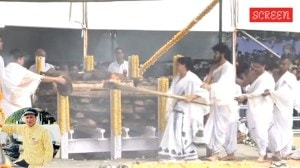We came to see if we can do anything. Can’t allow terror to take hold of us
Hours after the serial bomb blasts, the city of Jaipur showed its resilience as scores of citizens came forward to offer a helping hand.

Hours after the serial bomb blasts, the city of Jaipur showed its resilience as scores of citizens came forward to offer a helping hand. The Sawai Man Singh Hospital, where a majority of the bomb victims were brought, was filled with local residents who came with offers to donate blood or to help transport bodies and shift the injured from the attack site.
Groups of students from the city’s various educational institutions started arriving at the hospital as soon as news of the attack spread. “We have come here especially to see whether there is any need for us. We can’t allow terrorists to take a hold of our lives,” stated Vinod Agrawal, a student of GIT College of Engineering, who was accompanied by about 70 other students from the institute. The group patiently waited at the hospital into the wee hours of the morning to donate blood.
Similar sentiments were seen in the Muslim quarters of the city. Groups of young Muslim men from the Ram Ganj area listed their names so they could be called in case blood donors or volunteers were needed. “As soon as we heard about the incident we prepared a list of volunteers from the area. We will never let a rift be created between the two communities,” stated Abdul Qadir, a member of the Shanti Samiti established for maintaining communal peace in the city.
In the morning, the steady stream of volunteers continued to pour into the hospitals, many with biscuits, juices and water in hand for the injured and their relatives. Members of religious groups and cadres of organisations like the RSS and the Congress’s Seva Dal also visited the hospitals to provide support to the victims.
Similar scenes could be seen at the mortuary, where several students and social workers were witnessed assisting professionals.
SMS Hospital has announced free medical treatment and medicine for the victims. Dr Ashok Panagariya, Dean of the SMS Medical College, said the hospital was able to deal with the injured in the immediate aftermath of the serial blasts as it had put its emergency plan into action.
“We deployed all our senior doctors and faculty members on duty along with the other staff. This was the reason that we were able to operate upon 24 patients within the first three hours of the incident,” he said.
Photos



- 01
- 02
- 03
- 04
- 05




























